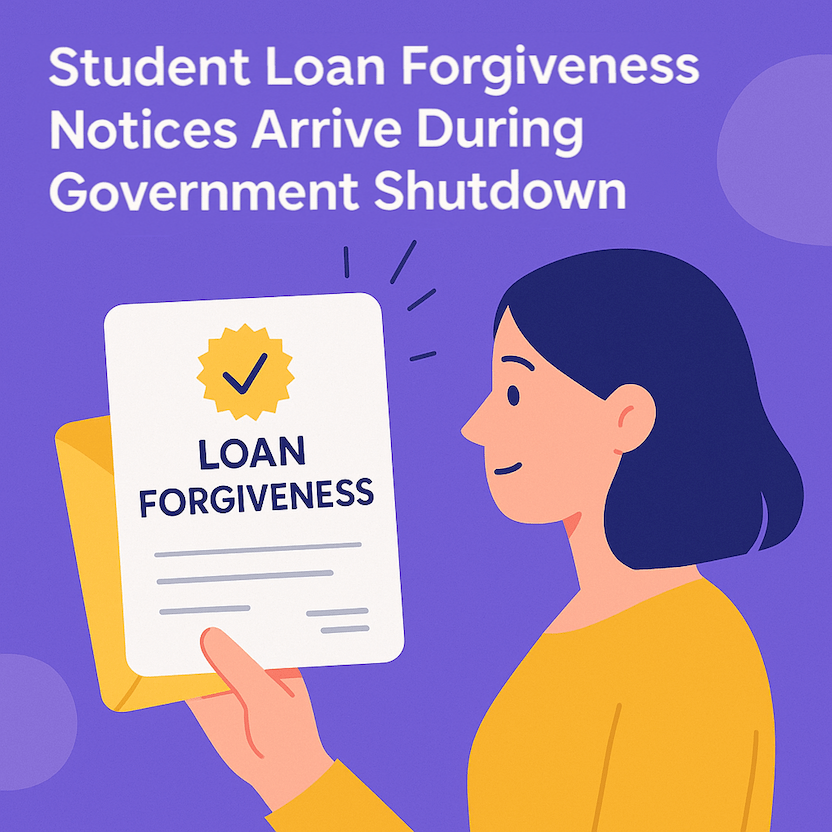Advertiser Disclosure
Last update: October 10, 2025
6 minutes read
Trump Admin’s Student Loan Forgiveness Notices Arrive During Government Shutdown: What Borrowers Need to Know
Why are student loan forgiveness notices going out during a government shutdown? We break down the IBR plan changes and what this means for your debt timeline.

By Derick Rodriguez, Associate Editor
Edited by Yerain Abreu, M.S.
Learn more about our editorial standards



By Derick Rodriguez, Associate Editor
Edited by Yerain Abreu, M.S.
Learn more about our editorial standards
Remember when the government shutting down meant everything stopped? Not this time.
If you've been making student loan payments for decades, you might have just gotten an email from the Department of Education saying your loans will be forgiven. Here's what's happening and why it matters.

Key takeaways
- The Department of Education is sending forgiveness notices to IBR borrowers despite the government shutdown
- IBR loan forgiveness was paused in July 2025 but started back up for borrowers who've made 20-25 years of payments
- Borrowers have until October 21, 2025 to opt out if they choose
Why is loan forgiveness happening during a shutdown?
The Department of Education stopped IBR forgiveness back in July. They needed to respond to court orders about which payments should count toward forgiveness. Borrowers who'd been paying for 20+ years got stuck with debt they shouldn't technically owe anymore.
That created big problems. The American Federation of Teachers sued the Trump administration in March, saying it violated borrowers' rights. The union represents nearly 2 million members who depend on these programs.
Now, even with the shutdown, those forgiveness notices are going out. The emails say loans will be discharged "over the next several months."

TuitionHero Tip
If you get a forgiveness notice, save it right away and keep copies. You'll want that documentation if problems come up later.
What is the IBR plan, and why does it matter?
Income-Based Repayment (IBR) calculates your monthly payment based on what you earn, not just what you owe. After you make payments for enough years, any leftover balance gets wiped out.
IBR forgiveness timeline:
Loan Type | Years of Payments Required | Total Payments Needed |
|---|---|---|
Undergraduate loans only | 20 years | 240 payments |
Any graduate loans | 25 years | 300 payments |
Here's the big deal: After Congress passed Trump's recent bill, several student loan plans got phased out. IBR is now the only plan left that offers debt forgiveness.
Who's getting these forgiveness notices?
You'll get a notice if you:
- Are enrolled in an IBR plan
- Made 20 years of payments (undergrad loans) or 25 years (grad loans)
- Have your account in good standing
- Had your payment history verified by the Department of Education
The notices aren't going to everyone in IBR. Just those who hit their forgiveness milestone and had their cases reviewed during the pause.
Compare private student loans now
TuitionHero simplifies your student loan decision, with multiple top loans side-by-side.
Compare Rates
Should you opt out of forgiveness?
The notices give you until October 21, 2025 to say no to forgiveness. Why would anyone turn down free money?
Taxes.
Student loan forgiveness is tax-free through the end of 2025, but Trump's recent bill didn't extend that protection. If your loans get forgiven in 2026 or later, you'll owe federal income tax on the forgiven amount.
Tax impact example:
Forgiven Amount | Tax Bracket | Potential Tax Bill |
|---|---|---|
$30,000 | 22% | $6,600 |
$50,000 | 24% | $12,000 |
$75,000 | 24-32% | $18,000-$24,000 |
So if $50,000 gets forgiven next year, the IRS treats that like you earned $50,000. You could owe $12,000 in taxes.
Opt out if:
- Your remaining balance is under $10,000
- You're almost done paying anyway
- You can't afford a big tax bill next year
- You're in a high tax bracket
Accept forgiveness if:
- You still owe $30,000 or more
- Paying off your loans will take years
- The tax bill is still way less than what you owe
- You can save up for the tax payment

TuitionHero Tip
Talk to a tax professional before deciding. Your specific income and state tax situation matters.
What if you're still waiting for forgiveness?
Tons of borrowers are still waiting for their forgiveness decisions. The shutdown makes processing even slower.
If you're waiting for your IBR forgiveness:
- Your application is probably still in line
- Nobody knows how long processing will take
- Keep making your monthly payments
- Missing payments could restart your forgiveness clock
- Write down every call or email with your servicer
- Check your account weekly
Problems that need attention now:
- No response after 60+ days
- Wrong payment count on your account
- Loans showing the wrong repayment plan
- Missing payment history from old servicers
- Forbearance or deferment counted wrong

What should you do right now?
Check your email and loan servicer account. If you got a forgiveness notice, follow these steps:
- Step 1 - Check the details: Make sure the forgiveness amount looks right based on your loan history.
- Step 2 - Calculate the tax hit: Use the table above to estimate what you might owe in taxes.
- Step 3 - Decide by October 21: You don't have long to choose. Missing the deadline means automatic forgiveness.
- Step 4 - Save everything: Screenshot emails, download PDFs, print notices. Keep it all in one folder.
- Step 5 - Update your contact info: The Department needs to reach you if something comes up.
If you think you should qualify but haven't gotten a notice, call your loan servicer. Have your payment history ready.
How does this affect other forgiveness programs?
Public Service Loan Forgiveness (PSLF) works separately from IBR. Earlier this year, Trump signed an order to change PSLF eligibility rules. Those changes aim to limit who qualifies.
PSLF forgives loans after 10 years of payments while working for government or nonprofit organizations.
Teacher loan forgiveness, disability discharges, and closed school discharges all follow different rules. Those programs haven't been paused like IBR was.
Your options if forgiveness is years away
If you're not close to forgiveness yet, here are your other choices.
Repayment strategy comparison:
Strategy | Best For | Pros | Cons |
|---|---|---|---|
Stay on IBR | People seeking forgiveness | Low payments, eventual forgiveness | 20-25 year wait, possible tax bill |
Refinancing | High earners with good credit | Lower rates, faster payoff | Lose federal benefits forever |
Standard 10-year plan | Stable income, smaller balances | Debt-free faster | Much higher payments |
Employer help | Jobs offering benefits | Free money for loans | Only some employers offer this |
Before you refinance, know this:
- You need decent credit (650+)
- You lose all federal loan protections
- No forgiveness ever
- You can't go back to federal plans
What you keep with IBR:
- Payments based on your income
- Forgiveness after 20-25 years
- Options for forbearance or deferment
- Protection if your income drops
Everyone's situation is different. What works depends on how much you owe, what you earn, and your career plans.

TuitionHero Tip
Use our calculator to compare repayment options. Seeing the actual numbers helps you pick the best path.

Why trust TuitionHero
At TuitionHero, we help you find the best private student loans by comparing top lenders and breaking down eligibility, interest rates, and repayment options. Whether you need additional funding beyond federal aid or a loan without a cosigner, we simplify the process. We also provide expert insights on refinancing, FAFSA assistance, scholarships, and student credit cards to support your financial success.
Frequently asked questions (FAQ)
If you already got a notice, your forgiveness should still happen in the next few months. New applications will probably face delays until the shutdown ends.
Once your loans are discharged and you get confirmation, it's final. They can't reverse it unless they find fraud or major errors. Policy changes don't affect forgiveness that's already done.
Contact your servicer immediately. Ask for a detailed payment history showing what counted and what didn't. Some payments get excluded because of forbearance or other reasons. You can dispute errors, but it takes time.
No. Unless you opt out by October 21, it happens automatically. You don't submit paperwork or do anything. Just wait for confirmation.
Forgiveness doesn't hurt your credit. The loans show as paid on your credit report. Your score might actually go up if your debt drops. The bigger worry is taxes, not credit.
Final thoughts
Getting a forgiveness notice during a shutdown is weird, but for borrowers who've paid for 20+ years, it means real financial freedom. The timing creates problems with taxes and getting answers, but these programs still exist.
If you got a notice, take time to understand what it means for you, and if you're still waiting, document everything and stay on your servicer. At TuitionHero, we're tracking all these changes and have tools to help you figure out your next move.
Source
Author

Derick Rodriguez
Derick Rodriguez is a seasoned editor and digital marketing strategist specializing in demystifying college finance. With over half a decade of experience in the digital realm, Derick has honed a unique skill set that bridges the gap between complex financial concepts and accessible, user-friendly communication. His approach is deeply rooted in leveraging personal experiences and insights to illuminate the nuances of college finance, making it more approachable for students and families.
Editor

Yerain Abreu
Yerain Abreu is a Content Strategist with over 7 years of experience. He earned a Master's degree in digital marketing from Zicklin School of Business. He focuses on college finance, a niche carved out of his journey through the complexities of academic finance. These firsthand experiences provide him with a unique perspective, enabling him to create content that's informative and relatable to students and their families grappling with the intricacies of college financing.
At TuitionHero, we're not just passionate about our work - we take immense pride in it. Our dedicated team of writers diligently follows strict editorial standards, ensuring that every piece of content we publish is accurate, current, and highly valuable. We don't just strive for quality; we aim for excellence.
Related posts
While you're at it, here are some other college finance-related blog posts you might be interested in.
Shop and compare student financing options - 100% free!

Always free, always fast
TuitionHero is 100% free to use. Here, you can instantly view and compare multiple top lenders side-by-side.

Won’t affect credit score
Don’t worry – checking your rates with TuitionHero never impacts your credit score!

Safe and secure
We take your information's security seriously. We apply industry best practices to ensure your data is safe.
Finished scrolling? Start saving & find your private student loan rate today
Compare Personalized Rates


